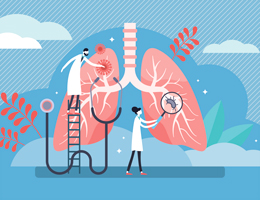
3. What are some other risk factors?
4. How can I reduce my risk of lung cancer?
6. How do I know whether I have lung cancer?
7. How is lung cancer treated?
8. Where can I go to learn more?
Answers
Lung cancer occurs when abnormal cells in the lungs divide and multiply haphazardly, eventually forming a tumor. The cancerous cells that make up the tumor can invade and destroy nearby healthy lung tissue. These cells can also break away from the tumor, travel to other parts of the body and establish new tumors.
There are two main types of lung cancer: small cell and non-small cell. Small cell lung cancer is also called oat cell cancer. The three main types of non-small cell lung cancer are squamous cell carcinoma, adenocarcinoma and large cell carcinoma. Non-small cell lung cancer accounts for about 80–85% of lung cancers. It usually grows and spreads less quickly than small cell lung cancer.
Smoking cigarettes is by far the biggest cause of lung cancer. The American Cancer Society (ACS) says that about 8 out of 10 lung cancer deaths result from smoking. The risk depends on when a person begins smoking, how long they have smoked, how many cigarettes a day they smoke, and how deeply they inhale. Cigar and pipe smoking and breathing someone else's smoke also increase the chance of developing lung cancer.
3. What are some other risk factors?
Lung cancer risk increases with age, with 70 being the average age at diagnosis.
Breathing radon, an invisible, odorless radioactive gas found naturally in rocks and soil, can cause lung damage that may lead to cancer. Smoking makes radon even more dangerous.
Inhaling asbestos fibers can also increase a person's chance of getting lung cancer, as can exposure to other industrial substances.
Lung diseases such as tuberculosis, pneumonia and previous lung cancer are also risk factors. Scientists are studying a possible link between lung cancer and air pollutants.
4. How can I reduce my risk of lung cancer?
Don't ever start smoking. If you do smoke, stop right away. Quitting smoking greatly reduces your risk of lung cancer. If you've already had lung cancer, quitting may reduce the chance of a new cancer. Stay away from people who are smoking and keep babies and children away from smoke too.
Also, you can check the radon level in your home with a simple test kit. Follow safety procedures if you work around asbestos or other dangerous substances.
Your hospital, your doctor or a nurse can give you ideas, as can the ACS, the American Lung Association, the National Cancer Institute, the Centers for Disease Control and Prevention, and many local and state health agencies.
6. How do I know whether I have lung cancer?
Unfortunately, lung cancer often does not cause symptoms until it has spread. Symptoms may include a persistent cough, constant chest pain, shortness of breath, wheezing, coughing up blood, hoarseness, swelling of the neck and face, repeated bouts of bronchitis or pneumonia, loss of appetite, weight loss or fatigue. See your doctor if you have any of these problems. They may not necessarily signal lung cancer but may be caused by another condition.
7. How is lung cancer treated?
Certain tests are used to diagnose lung cancer and to determine its extent, or stage. The doctor uses this information to plan treatment, which also depends on the type of cancer and the tumor's size and location. Treatment may include surgery, chemotherapy, radiation therapy, targeted therapy, laser therapy, cryotherapy and photodynamic therapy, in which a combination of drugs and laser light is used to kill cancer cells.
8. Where can I go to learn more?
To learn more about lung cancer, visit the Lung cancer health topic center. You can also learn more at these websites:
Reviewed 8/15/2025